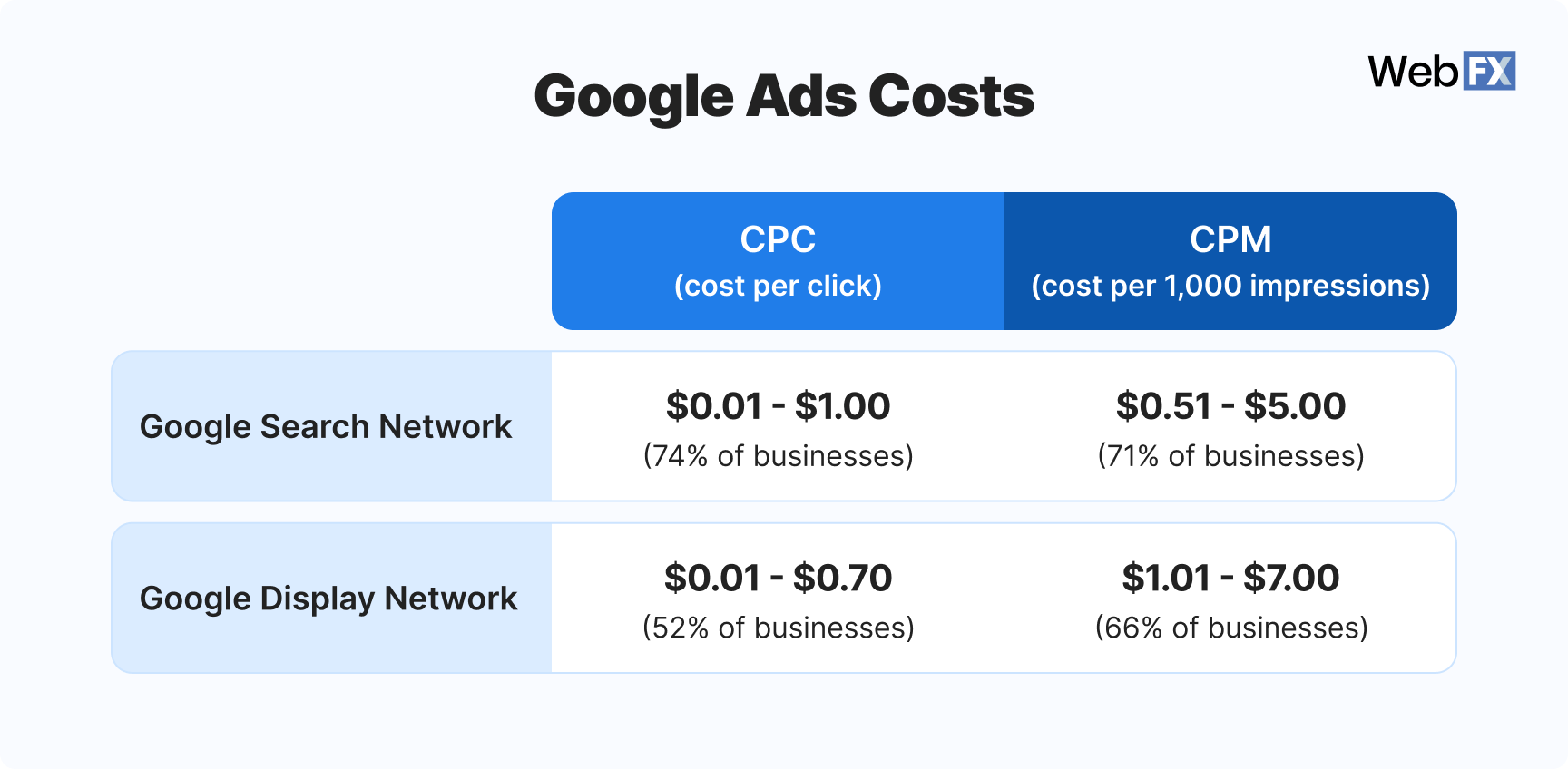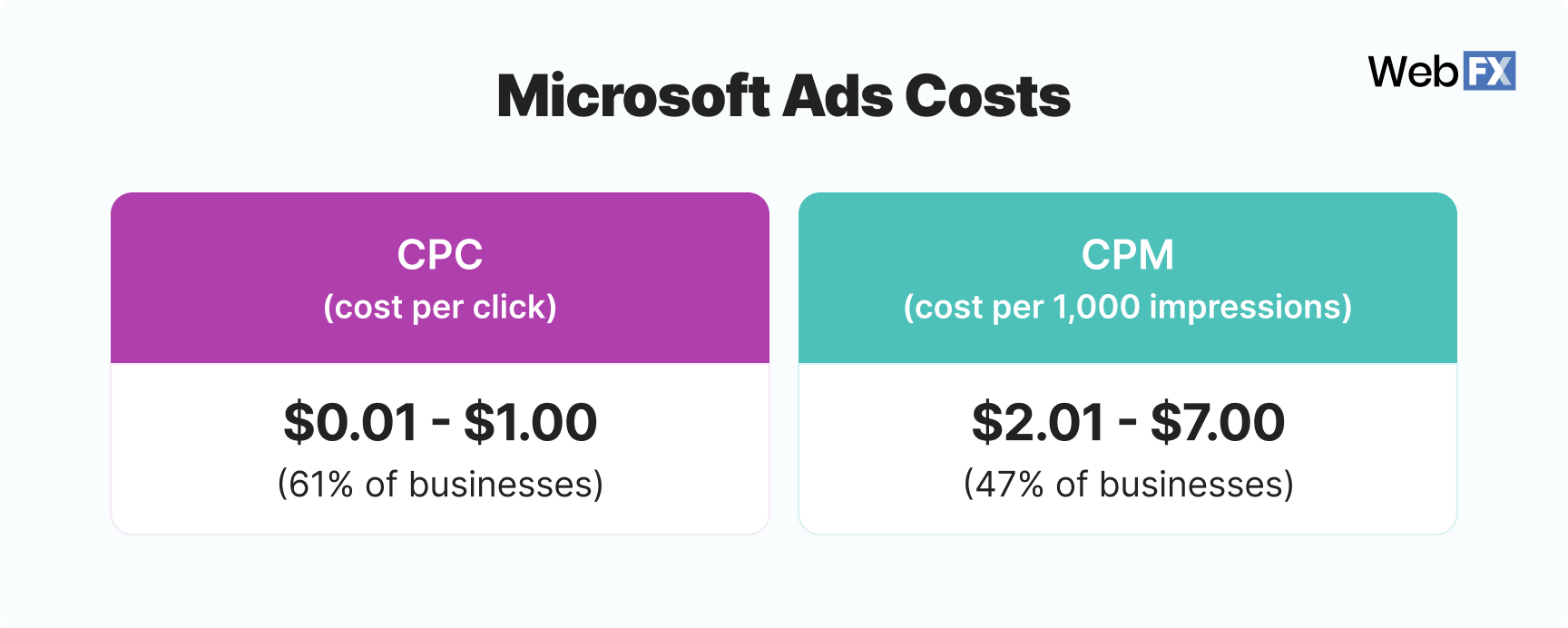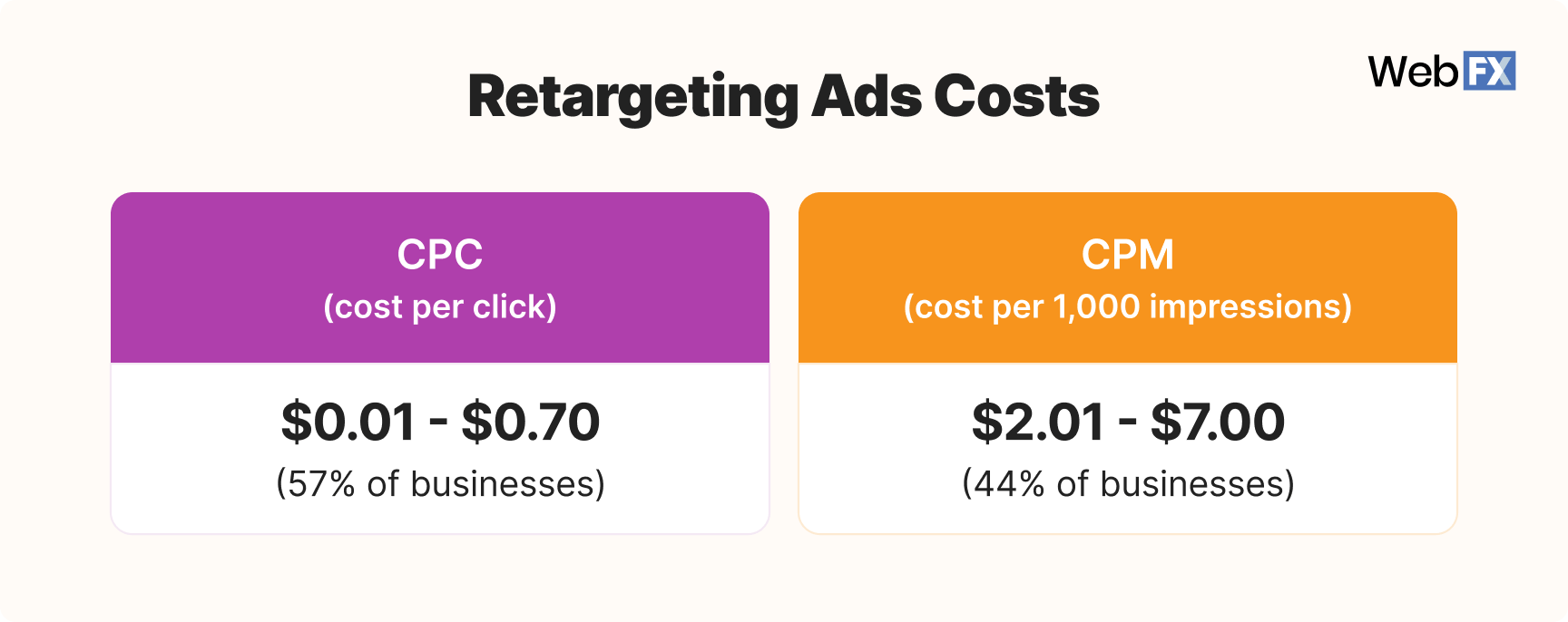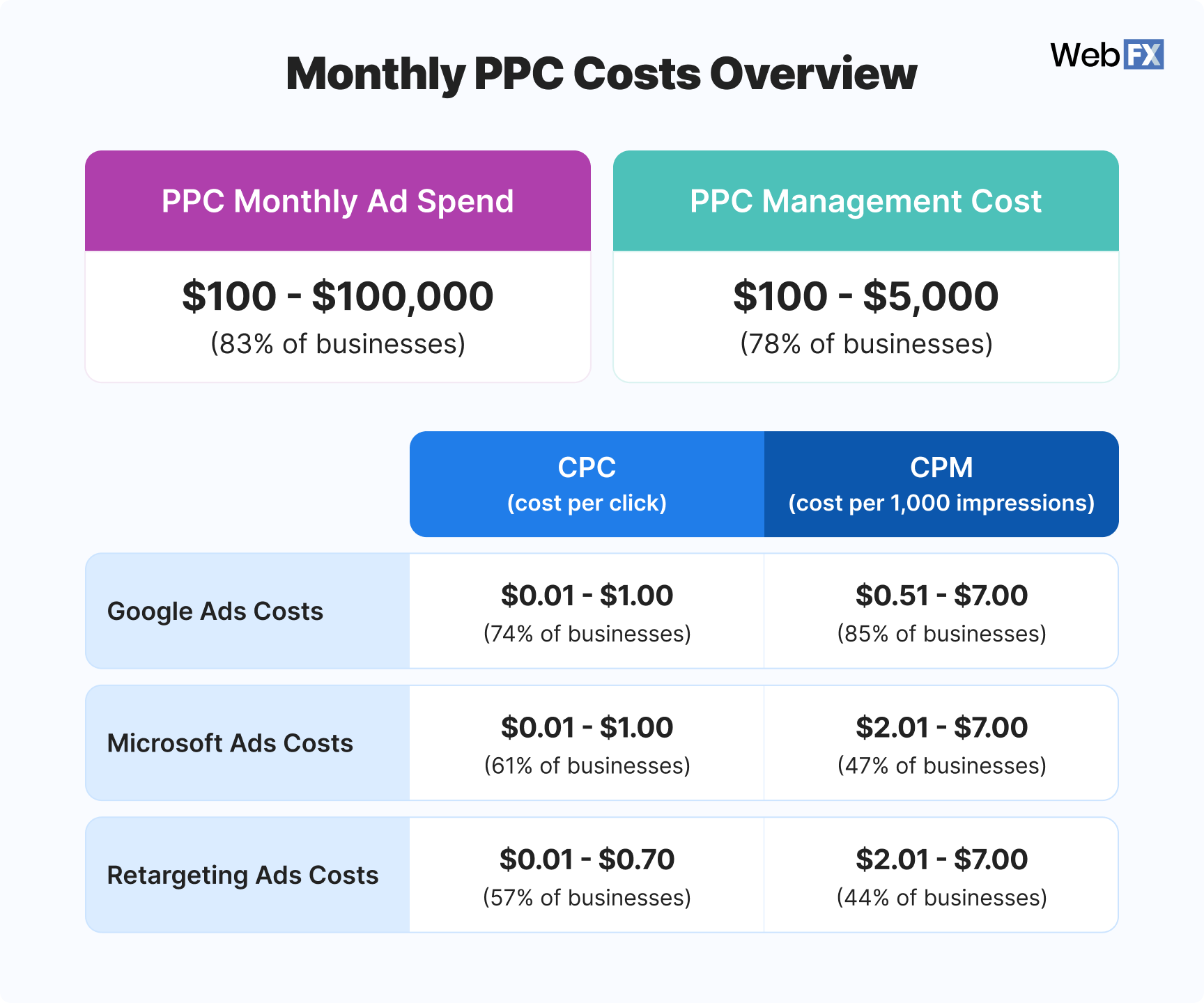PPC Pricing: How Much Does PPC Cost in 2026?
Last Updated: January 28, 2026
On average, a typical business spends $0.01 – $1 per click on PPC ads. PPC advertising costs can vary depending on several factors, like your industry, the competitiveness of the keywords you want to target, the platform you advertise on, and more. Learn more about PPC pricing now, or connect with our award-winning team for professional help improving your return on ad spend!methodology:
An Inside Look at WebFX PPC Pricing
🔎 PPC audit Boost your visibility, generate leads, and drive conversions with WebFX’s custom PPC solutions tailored to your unique company’s needs, goals, and industry.
WebFX Expertise
Highlights
🖌️ Ad design
📝 Ad copywriting
🎨 Ad landing page builds and optimization
💰 Bid management
Join the 1,450+ trusting WebFX to drive revenue through paid search
Too many marketing providers take a copy-and-paste approach to pay-per-click ads. That’s not our style.
Explore WebFX’s PPC prices
| Features | Lite | Pro Most Popular | Enterprise |
|---|---|---|---|
| Investment | |||
| Ad Spend Limit | $100 – $5,000/month ad spend (paid to networks) | $5,000 – $30,000/month ad spend (paid to networks) | $30,001+/monthly ad spend (paid to networks) |
| Initial Optimization | $1,200 (First Month’s Management including Campaign Audit) | $2,250 (First Month’s Management, including Campaign Audit, Creative Development) | $5,800 (First Month’s Management, including Campaign Audit, Creative Development) |
| Progressive monthly management cost: | $750 | $975 or 15% of spend, whichever is higher | $4,500 or 12% of ad spend, whichever is greater |
| Included Networks | |||
| Google PPC Network | |||
| Google Local Services Ads | |||
| Bing PPC Networks | |||
| Google Text Ad Remarketing & Banner Remarketing (if banner ads are included, provided by the client, or creative banner design is paid for) | |||
| Google customer match & audience match | |||
| Google Shopping Management | |||
| AdTechFX Programmatic Advertising powered by RevenueCloudFX | |||
| – 3rd Party Audience Targeting | |||
| – Account-Based Retargeting | |||
| – CRM Pipeline Retargeting | |||
| Management Deliverables | |||
| 750+ SMEs behind campaign driving results | |||
| Initial campaign development & strategy | |||
| Advanced keyword research and selection | 2,000 Keywords | 10,000 Keywords | 10,000 Keywords |
| Industry analysis | Yes | ||
| Ad campaign copywriting | |||
| Ad copy performance testing | |||
| Ongoing keyword development and tweaking | |||
| Dynamic keyword insertion into ads | |||
| Google analytics integration & goal tracking | |||
| Strategic bid management | |||
| PPC account settings monitoring (Ex. Geotargeting) | |||
| Campaigns will be managed through client’s SEM accounts for (client will retain Admin/owner access of all campaigns created) | |||
| Up to two personal consultations per month | |||
| Monitoring clicks, conversions and click fraud activity | |||
| Setup and management of rule based bidding | |||
| International PPC campaign management (Addtl. fees may apply) | |||
| Creative Deliverables | |||
| Setup of 1 FunnelsFX Landing Page template | |||
| Display Ad Creatives (One Time) | One Time: 2 sets rapid display ads – 16 ads total (8 images per set) | One Time: Up to 3 Sets of Custom Layout Display Ads – 24 Ads Total (8 images per set) | |
| Connected TV Commercial Ads (One Time) | N/A | One Time: 1 15-second rapid ConnectedTV ad | One Time: 1 Set of Rapid CTV Ads 15 + 30 Seconds (2 videos total) |
| Audio Commercial | Coming Soon | Coming Soon | |
| International Campaigns (SEM Only) – Each additional language monthly management cost: | $325 | $325 | |
| Performance Reporting | |||
| Monthly performance & analysis reporting | |||
| Website conversion analysis reporting | |||
| Omni-channel customer journey tracking and reporting | |||
| Federated Ad CLID Pool for tracking calls to specific paid ad campaign | Shared pool (Up to 25 concurrent Paid Advertising visitors) | Shared pool (Up to 50 concurrent Paid Advertising visitors) | |
| IntegrationsFX: Conversion Based Smart Bidding | Included with  License License | Included with  License License | |
| IntegrationsFX: Lookalike + Custom Audiences | Included with  License License | Included with  License License | |
| Add Ons | |||
| Dedicated Federated Ad CLID Pool of 25 dedicated numbers and 25 concurrent visitors | $100/month | $100/month | $100/month |
| Dedicated Federated Ad CLID Pool of 100 dedicated numbers and 100 concurrent visitors | $400/month | $400/month | $400/month |
| Display Ads: Rapid CTA Layout – 4 Variation Sets for A/B Testing of 11 Sizes Each (44 Display Ads Total) & No Client Edits Included | $375/month | $375/month | $375/month |
| Display Ads: Rapid CTA Layout – 6 Demographic / Age Cohort Sets of 11 Display Sizes (66 Display Ads Total) & No Client Edits Included | $940/month | $940/month | $940/month |
| B2B Display Ads: Rapid CTA Layout – 10 Industry Ad Sets of 11 Display Sizes (110 Display Ads Total) & No Client Edits Included | $1,500/month | $1,500/month | $1,500/month |
| Display Ads: Custom Layout – 1 Set of 8 Sizes & Up to 2 round of client edits | $1,125/month | $1,125/month | $1,125/month |
| ConnectedTV – Rapid CTA Layout Video Ad – 15 seconds | $190/month | $190/month | $190/month |
| ConnectedTV – Rapid CTA Layout Video Ad – 15 seconds – 2 CTV Ad Variants for A/B Performance Testing | $375/month | $375/month | $375/month |
| ConnectedTV – Rapid CTA Layout Video Ad for 15 + 30 seconds | $375/month | $375/month | $375/month |
| Social Media Advertising | $975/month | $975/month | $975/month |
| Landing page performance testing | $1,800/month | $1,800/month | $1,800/month |
| Translation Services | By Quote | By Quote | By Quote |
| Website conversion analysis implementation | By Quote | By Quote | By Quote |
Need more information? Call Us: 888-601-5359 | GET STARTED | GET STARTED | GET STARTED |
Budget over $50k/mo? Check out our enterprise campaign management offerings for campaigns from $50k-$2m/mo in ad spend.
PPC cost calculator
Get accurate PPC management pricing with our free PPC cost calculator!
PPC Pricing Calculator
Meet WebFX
A world-class digital marketing agency with thousands of reviews applauding our transparency.


Related Resources
-
Grow Your Sales with Google Shopping Management Services 8 minute read
-
 How to Choose the Best PPC Agency to Improve Your ROI 7 minute read
How to Choose the Best PPC Agency to Improve Your ROI 7 minute read -
The 13 Best Google Ads Agencies Around the World 2 minute read
-
The World’s Best PPC Companies in 2026 3 minute read
-
 What Do PPC Services Include? Deliverables & Benefits of Working with a PPC Agency 5 minute read
What Do PPC Services Include? Deliverables & Benefits of Working with a PPC Agency 5 minute read
PPC pricing FAQs
Get answers to FAQs about PPC costs now:
How much does PPC cost?
Most businesses spend $100 to $100,000 per month on pay-per-click advertising. How much you’ll spend depends on factors like the competitiveness of your industry and the keywords you’re targeting, which in turn affects your cost-per-click (CPC) and cost per 1,000 impressions (CPM).
What is the cost of PPC based on?
The cost of PPC depends on many different factors, like:
- The company you work with
- The specific services included in the package you choose
- The size of your campaigns and ad spend
- The number of networks on which you advertise
- The types of ads you use
What percentage of your overall marketing budget should you allocate to PPC advertising?
Businesses typically allocate 11% – 25% of their budget to PPC ads (44% of respondents). You may allocate more or less of your budget to PPC advertising depending on your unique needs, goals, and the return you receive from PPC ads.
Source Data
| % of Budget Allocated to PPC Advertising | % of Businesses |
| Less than 5% | 4.65% |
| 6% – 10% | 22.67% |
| 11% – 25% | 43.60% |
| 26% – 50% | 16.86% |
| 51% – 70% | 9.30% |
| 71% – 90% | 1.74% |
| More than 90% | 1.16% |
How much does Google Ads cost?
Google Ads costs $0.01 – $1 per click (74% of respondents) and $0.51 – $7 per 1,000 impressions (85% of respondents) on average. How much you spend on Google Ads will depend whether you choose to advertise on the Google Search Network or the Google Display Network, along with your industry and PPC budget.

How much does it cost to advertise on the Google Search Network?
Advertising on the Google Search Network costs $0.1 – $1 per click (74% of respondents) and $0.51 – $5 per 1,000 impressions (71% of respondents) on average. Like we mentioned before, your costs can vary depending on your industry and ad budget.
Source data
| Google Search Network Cost Per Click | % of Businesses |
| Less than $0.10 | 12.30% |
| $0.11 – $0.50 | 36.89% |
| $0.51 – $0.70 | 11.48% |
| $0.71 – $1.00 | 13.11% |
| $1.01 – $2.00 | 6.56% |
| $2.01 – $3.00 | 6.56% |
| $3.01 – $5.00 | 6.56% |
| $5.01 – $7.00 | 1.64% |
| $7.01 – $10.00 | 0.00% |
| More than $10.00 | 4.92% |
| Google Search Network CPM | % of Businesses |
| Less than $0.50 | 3.85% |
| $0.51 – $1.00 | 17.31% |
| $1.01 – $2.00 | 23.08% |
| $2.01 – $3.00 | 15.38% |
| $3.01 – $5.00 | 15.38% |
| $5.01 – $7.00 | 13.46% |
| $7.01 – $10.00 | 7.69% |
| More than $10.00 | 3.85% |
How much does it cost to advertise on the Google Display Network?
Advertising on the Google Display Network costs $0.01 – $0.70 per click (52% of respondents) and $1.01 – $7 per 1,000 impressions (66% of respondents).
Source data
| Google Display Network CPC | % of Businesses |
| Less than $0.10 | 13.04% |
| $0.11 – $0.50 | 27.54% |
| $0.51 – $0.70 | 11.59% |
| $0.71 – $1.00 | 5.80% |
| $1.01 – $2.00 | 7.25% |
| $2.01 – $3.00 | 11.59% |
| $3.01 – $5.00 | 8.70% |
| $5.01 – $7.00 | 4.35% |
| $7.01 – $10.00 | 2.90% |
| More than $10.00 | 7.25% |
| Google Display Network CPM | % of Businesses |
| Less than $0.50 | 9.38% |
| $0.51 – $1.00 | 9.38% |
| $1.01 – $2.00 | 15.63% |
| $2.01 – $3.00 | 9.38% |
| $3.01 – $5.00 | 21.88% |
| $5.01 – $7.00 | 18.75% |
| $7.01 – $10.00 | 15.63% |
| More than $10.00 | 0.00% |
How much does Microsoft Advertising cost?
Microsoft Advertising costs $0.01 – $1 per click (61% of respondents) and $2.01 – $7 per 1,000 impressions (47% of respondents) on average.

How much do retargeting ads cost?
Retargeting ads cost $0.01 – $0.70 per click (57% of respondents) and $2.01 – $7 per 1,000 impressions (44% of respondents).

How much do Meta ads cost?
On average, Meta ads cost $0.26 – $0.30 per click and $1.01 – $3.00 per 1,000 impressions. Meta ads are a great way to promote your products or services on social media platforms like Facebook and Instagram.
How much should I pay for PPC?
How much you pay for PPC depends on several factors, including:
- Your company size
- Your industry
- Your PPC strategy
- Your PPC budget
- Your PPC goals
Just because the average business invests a certain amount into PPC each month doesn’t mean your company should. Depending on your marketing strategy, for example, you might have plenty of traffic (and sales) coming from other channels, like search.
Evaluate your company’s budget, goals, and industry to determine what spend makes the most sense.
Is PPC worth the cost?
Yes, PPC is worth the cost. In fact, 95% of businesses are satisfied with the ROI they receive from their PPC ad campaign. With an effective strategy, you can successfully reach your target audience to increase your online visibility and drive more traffic to your website.
How much does PPC management cost from an agency?
PPC management from an agency costs $100 – $5,000 per month on average (77% of respondents). How much you spend can depend on the particular agency you choose, your ad spend budget, and your industry. For example, more competitive industries may need to spend more on their PPC ad bids.
Source Data
| PPC Agency Management Cost | % of Businesses |
| Less than $100 | 0.00% |
| $100 – $500 | 14.86% |
| $501 – $1,000 | 20.27% |
| $1,001 – $3,000 | 20.27% |
| $3,001 – $5,000 | 21.62% |
| $5,001 – $8,000 | 8.11% |
| $8,001 – $11,000 | 4.05% |
| $11,001 – $15,000 | 4.05% |
| More than $15,000 | 6.76% |
How much does PPC management cost from a freelancer?
PPC management from a freelancer costs $100 – $3,000 per month on average (75% of respondents). It’s important to note that costs can vary depending on the freelancer you choose. While working with a freelancer does have its perks, working with an agency usually gives you access to a larger team of specialists and more support for your strategy.
Source Data
| PPC Management Pricing From a Freelancer | % of Businesses |
| Less than $100 | 6.25% |
| $100 – $500 | 31.25% |
| $501 – $1,000 | 31.25% |
| $1,001 – $3,000 | 12.50% |
| $3,001 – $5,000 | 6.25% |
| $5,001 – $8,000 | 6.25% |
| $8,001 – $11,000 | 0.00% |
| $11,001 – $15,000 | 6.25% |
| More than $15,000 | 0.00% |
What is PPC?
PPC is a digital advertising strategy that allows you to launch ads on search engines, like Google or Bing. These ads appear at the top of the search results and are one of the first things users see when they search for something. As a result, PPC advertisements are highly effective in helping companies improve their brand awareness, website traffic, and sales.






